So, there have been many rave reviews on Amazon, with high praise going to the Outlite E6 LED flashlight. Now…with a more discriminating overview, it’s MY turn!
They Love This Kit!
So I must admit, Outlite has adorned this package with everything that one would need in order to start themselves off with an LED flashlight.
They get the E6, a rechargeable 18650 battery, a charger, a plastic tube to hold the battery, a secondary cage (holder) for three AAA batteries (since it runs on those too) AND, as an added bonus, a small key chain flashlight that operates on three (included) button-size batteries.
Let’s Go Piece by Piece
The Flashlight and “Claimed” LED
From the picture above, I hope you’ve realized that the LED inside the E6 is NOT a genuine CREE! It’s made by Lattice Bright. Here is the data sheet that shows the specs for this LED. Please note that its typical luminous-flux rating is 300 lumens!!! This is far and away LESS than the advertised 900 lumens that you’ll see online.
From the other picture above, I’ve also noted that there’s no heatsink between the LED (and star-base) and the driver chip below. What this omission indicates is that if the light is operated on high for an extended period, it will either shorten the life of the LED, or simply blow it out! This is due to the heat that the LED produces, which cannot be drawn away because there’s no heatsink!
Size.
It’s no small puppy. Because the head has a zoom function, it’s full length is 6.5″ Its length with the head retracted is 5.75″ The width at the widest point of the bezel, is almost 1.5″
Beam.
The beam produced by the LED is slightly blue in tint, and very uniform when at its widest. With the head extended, the beam sharpens down to the “square” outline of the LED. The head has enough resistance so that it can be stationary in virtually any position between the spot, and the widest point.
The images below demonstrate the “full” beam, the semi-full beam, and the squared spot. For the images in this section, I’ve tried to compare high mode to low mode, with identical shots. Click on each for a full size image.
The E6 has three modes; low, medium, high. Plus strobe and SOS. You should be able to tell from the pictures, that there’s not a BIG difference between high and low. Medium, of course, is right in the middle.
One firm click of the tail cap turns the light on, and a “soft press” advances to the next level. There’s no memory, so once its off, it will be on high when switched on again.
The Key Ring Mini;
At just slightly longer than my CooYoo Quantum SS key ring flashlight, this little “freebie” is okay for very up close illumination.
It has just one mode, activated by a small button on the end, and produces a distinctively “blue” beam. Three disposable button-size batteries are included.
The “FREE” 18650 Battery;
What can I say about this. It’s an Outlite 3.7 volt battery which claims 3600mAh. Under my exhaustive testing, I found it to be roughly 1930mAh. This low capacity means that under a high discharge it won’t have nearly as long a life as a better battery would.
Please refer to this article on fake battery capacities for more information.
Even more important, is that the battery claims to be circuit protected against over-discharge. Guess what… it’s NOT! In my testing, I was able to drop the voltage way down to 2.6! While in use in the E6, the output got dimmer and dimmer. A protected battery would normally not allow that to happen.
The “FREE” Charger;
Here we go again. What can I say about a generic charger…which on its rear end, “claims” to be a “smart charger”!
When I placed the Outlite battery in the charging bay the bright red light came on. Good! However, with the battery being low capacity, it shouldn’t have taken more than 3 hours to charge it from a depleted state. Well, the battery sat charging and after 9 hours (with the charging indicator still red) I removed the battery for a voltage check. It was only at 3.8! The goal is 4.2, so this battery had a ways to go. I wasn’t about to wait for it since I could easily see it taking about 12 hours to reach full voltage.
Did I finish the charge? Yes. I placed it in my Opus BT-C3100 charger, at 1000mA current, and it completed the rest of the charge in 90 minutes. On the backside of the generic unit, it says “1A” output!! This is obviously a poor attempt at humor. I’d estimate due to the slowness of the unit that it can’t be using much more than 200mA at best.
Thoughts & Suggestions
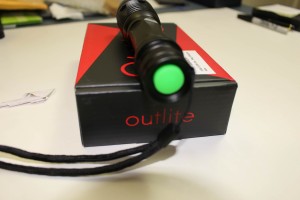
The colorful rear tail switch
In conclusion, the Outlite E6 is fine as a secondary flashlight. I would NOT count on it as my MAIN flashlight.
It’s not waterproof, but it meant to be water resistant. One thing to know about “zooming” flashlights, is even if water gets on the sliding portion of the neck when the head is extended, it should be wiped off before pulling the head forward again. If water were to get pulled into the sliding mechanism, it could spell trouble if it reached the LED.
The sliding head works well and stops where you need it to. On full beam width the brightness is only useful at close range. Sliding the head forward is necessary when using outside, but even at mid-zoom, don’t count on useful brightness lighting up anything further than maybe 25 feet.
In my opinion, medium and low mode (at least outside) aren’t terribly helpful. Although low mode is probably no more than about 100 lumens dimmer than high, you’ll need all the output you can get to make the light useful. This is where a more powerful battery is essential!
I’m also going to take issue with the quality of the anodizing on this light. OBVIOUSLY it’s not TypeIII, as you will find on MOST “quality” lights. In the photo below, you can see what happened after I took the end of a pair of scissors to the body of the light and gave it a few “sweeps”. It has left permanent scratches! This will NOT happen on ANY flashlight that is TypeIII hard anodized.
One interesting observation. I compared using an 18650, to three rechargeable NiMH AAA cells. Remarkably, I saw NO difference in output. So as an alternative you can use three AAA’s, but I’d recommend NiMH’s (such as Eneloop’s) because you’ll use up alkaline AAA’s pretty quick. If you go this route, then you WILL need a smart charger anyway. Most, such as those I linked to above and below, charge both Lithium-ion and NiMH. Thinking about balking over the extra cost? Hey… you’re getting a really cheap flashlight here… you can afford to shell out the extra bucks for some decent accessories.
If you think the E6 is the right light for you, then I would suggest buying a reliable, (protected) correct capacity 18650 battery. Also, unless you don’t mind waiting upwards of ten hours to charge that battery, then I’d suggest looking into a REAL “smart charger
“!
Questions or comments? I’m here for you 🙂





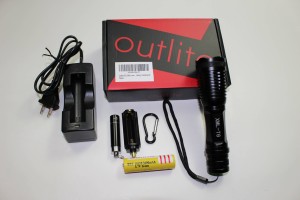
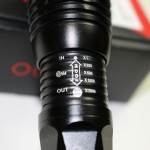
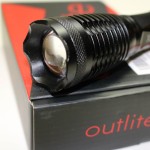

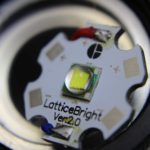
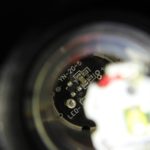
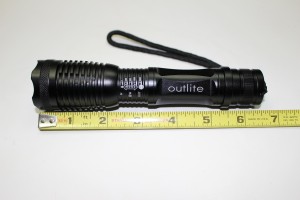
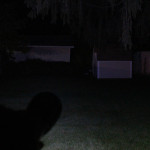
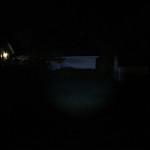
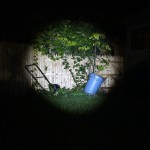

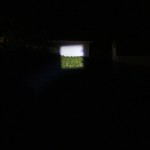
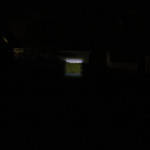

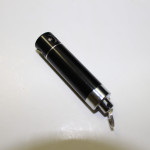
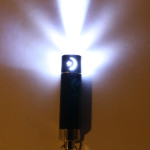
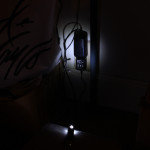
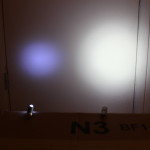
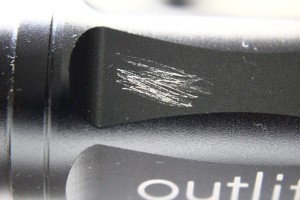
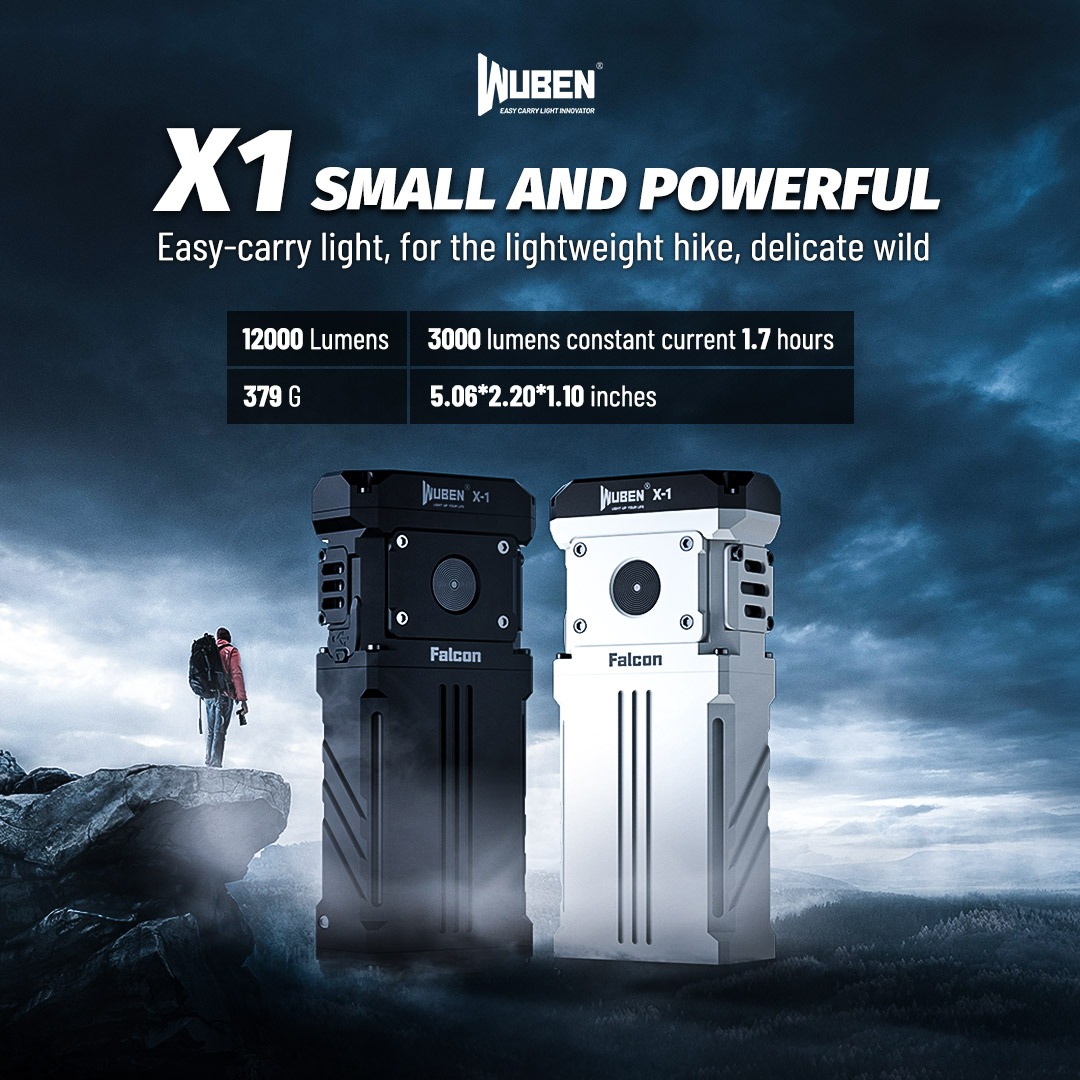
Thanks for the technical review…I purchased two of the Outlite E6 without battery or charger for $12.99 on amazon.com. I wanted a cheap spare for in the car LED lights that use Li-ion batteries. I have an Xtar VP2 charger and Orbtronic (ORB3500P) 18650 Li-ion batteries that I will use for power. After reading your review I hope they will operate a reasonable amount of time before failing. If not I’ll be out $12.99 for light…
The thing about lights from Outlite and other cheaper companies Daniel, is that it’s a crap-shoot. Some folks have had reasonable luck with them. Others have had them fail within a few weeks to months. Their track record is so-so. I guess like anything else it depends on how much you use them, although again, some folks have reported them breaking only after a few uses. Of course you can always say… “you get what you pay for”… but something I like to say when it comes to flashlights, is shop by BRAND… not by price! I will say this though; you made some EXCELLENT choices as far as a charger and batteries are concerned!! Those should definitely NOT “go bust” on you! Thanks for your comment 🙂
I don’t fully agree with the article. Writing on such things is as much subjective as objective in spite of the fact that we are discussing material things.
I can relate more to what BR wrote though. I have 3 of these lights in 2 different models. All 3 lights have worked flawlessly and over extended periods of time. I used my E6 with the globe as a room light and have left it on for hours, changing the battery as needed.
I don’t particularly like the Cooyoo comparison either. It may be just my thoughts and me, but that didn’t look like any Outlite I have used in your comparison. I am unimpressed by your 300 lumen claims, as I have a Coast that is rated at 280 lumens and the Outlite is much much brighter, over twice as bright. You must have gotten a less than satisfactory light.
I didn’t like the SOS or strobe options, but otherwise I cannot complain on any of the lights I have. The only problem I had was with the batteries, and they were made good. However I did end up buying EBL 18650 batteries for extras because of my constant use of the lights.
Yes one can make the claim, you get what you pay for. However that is also subjective, as what one person likes another dislikes. What one would complain about, another would not. But I am not going to spend 50 or or more dollars on a light and it not be at least 3X better than one costing 4X as much. Most common working people simply can’t waste that kind of money unless for a specific purpose.
Not only is the higher price unjustified, and not only can one buy 3 or 4 of the cheaper lights for the price of modestly priced light, but if you break the cheaper one by accident, you out much less money. And finally, 2 or 3 years down the road companies will come out with newer, even stronger and brighter flashlights, leaving your old one a bit antiquated. I have had the same thing happen to my the Coast flashlights I own, averaging about 45 dollars each. I only use them for backup in out of the way places, and the Outlites stays in my vehicles and house. I can mush easier spend 20 dollars for the next model Outlite or similar light than I can 60, 70 or 100 dollars for brand flashlight that will do no better. But to each their own as YMMV…
Mike360000
I appreciate your lengthy comment Mike.
I get what you’re saying with regards to subjective vs. objective. But the way I see it, there appears to be an enormous divide between those (like me) who are “flashaholics”, vs. those like you who probably consider a flashlight to be something that’s needed from time to time…BUT, you lack passion for.
To those like me who appreciate the way technology has entered the flashlight realm, why would I buy something for $20 that only partially reflects that technology, over one that’s “only” $30 more, and not only fully embraces the technology, but, offers more consistent performance.
You refer to “common working people”. Guess what? I AM ONE OF THOSE!! But I also consider a fully-featured flashlight to be a necessity. I never consider spending $50-$60 on a flashlight as a waste of money. I may think about it at great length before the purchase is made, but once I have it in hand, the price isn’t an issue any longer. My question to folks who say (as you did) about buying three or four cheaper lights…why waste $40 or $50 on four lights that if you drop them, they might break, as opposed to one or two much more durable lights.
Why did you say you don’t like the SOS or strobe options? I’m indifferent about them, and over 90% of lights made today have them. The thing about the Outlite (and dozens of others of the same build and price) you need to cycle through those modes to get to anything else. With 90% of the lights I own, you never need even SEE those modes unless you specifically need to. Convenience, is another reason for buying a better quality light. The convenience of “everyday carry” is BIG! The Outlite is 5-6 inches long, and is also THICK, and has no means of attaching it to your pocket or belt. This is a HUGE INCONVENIENCE.
I completely disagree with this statement; “I can mush easier spend 20 dollars for the next model Outlite or similar light than I can 60, 70 or 100 dollars for brand flashlight that will do no better.” Any of the $60 brand lights that I’ve reviewed on this site, will easily outperform anything Outlite has come out with thus far. $100 though…is even out of MY range.
You’re right about the way they promise to last for many years, and will probably seem “antique” within 5 years as something more amazing is sure to be introduced. Well, all I can say to that is…that’s what eBay is for!! Either that, or I’ll open a flashlight museum 🙂
Thanks again for your thoughtful viewpoint.